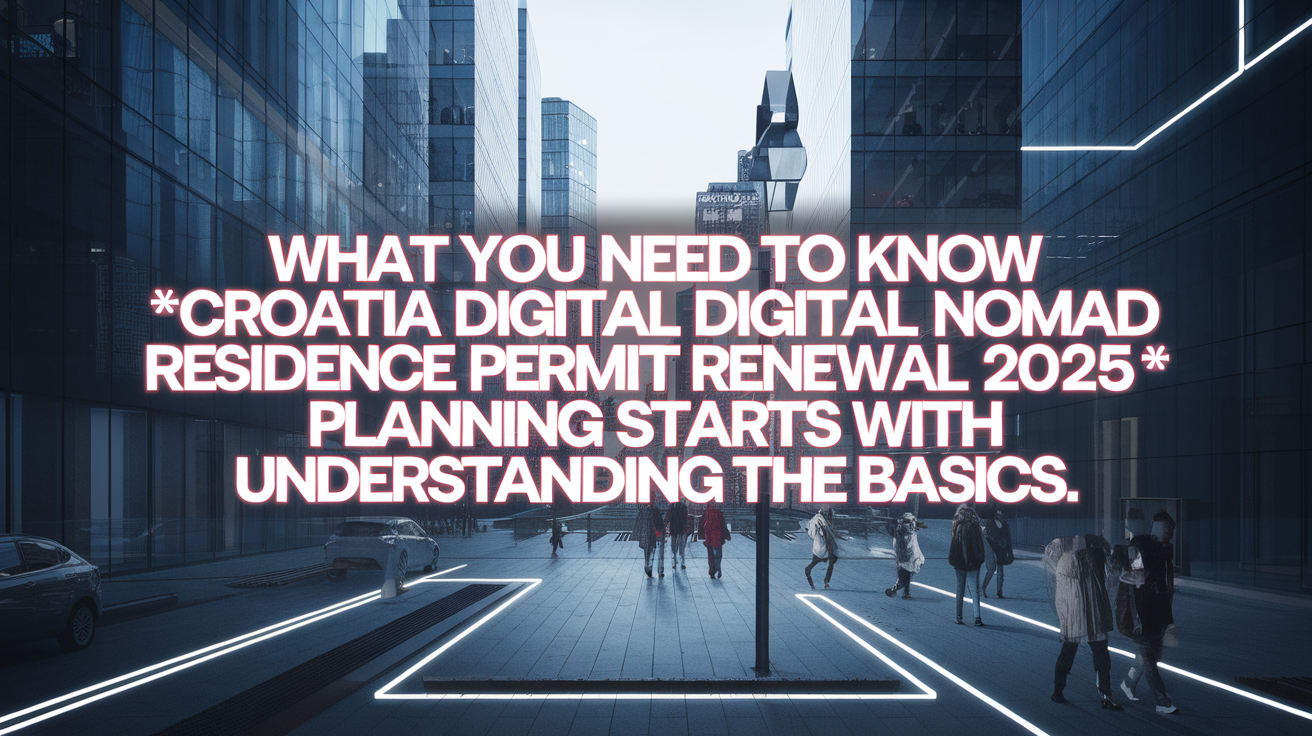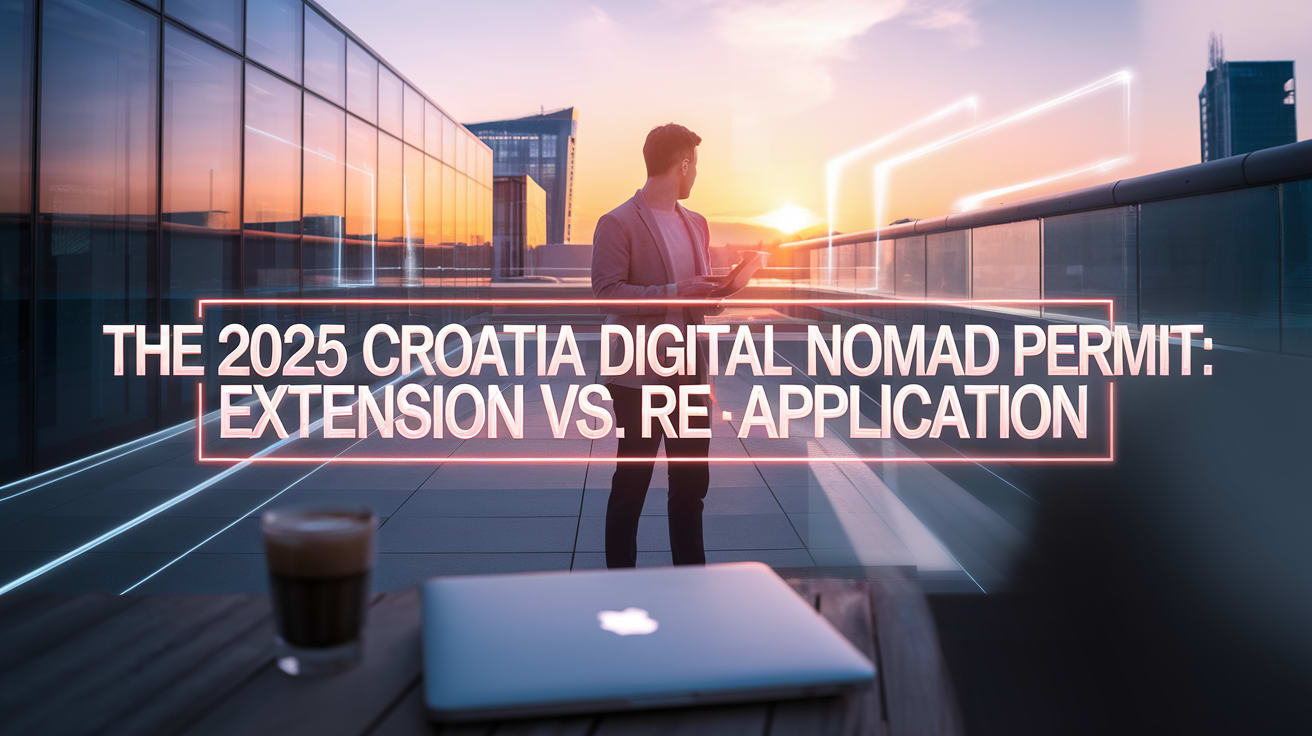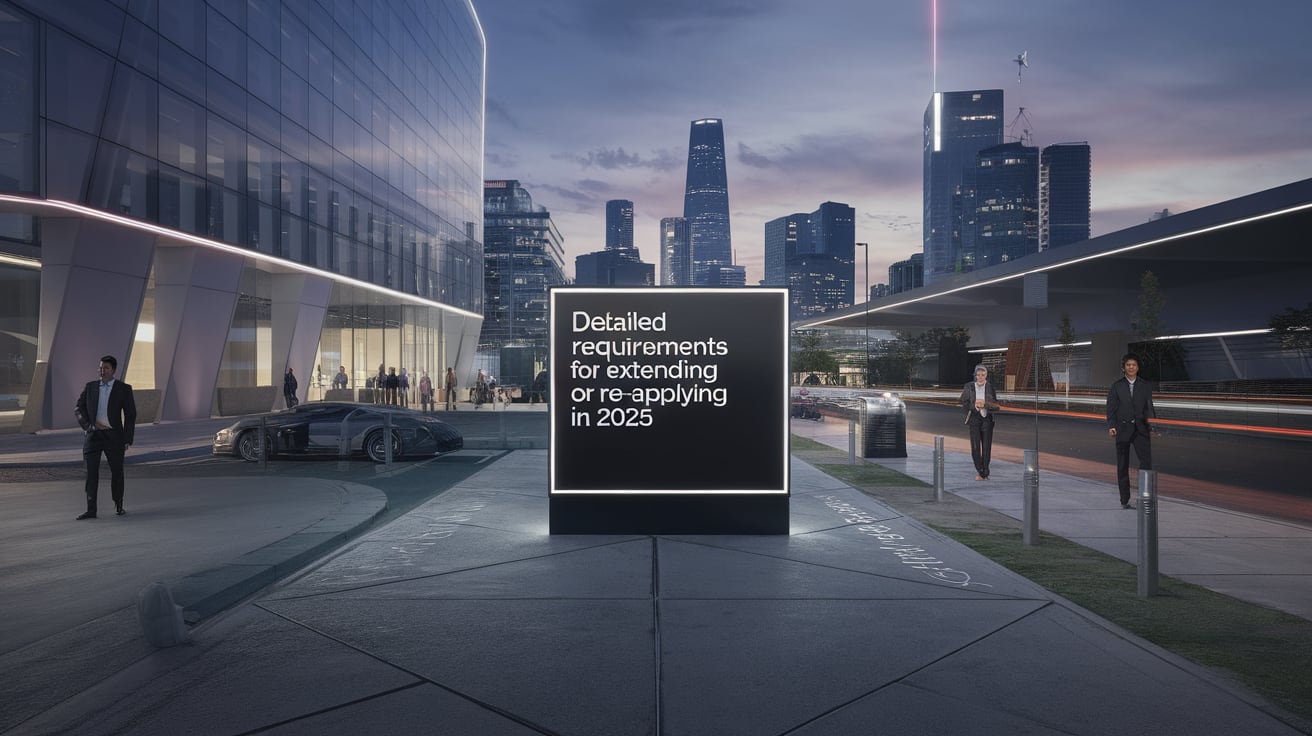Croatia digital nomad residence permit renewal 2025
Imagine spending a year working from a sun-drenched café in Split, taking weekend trips to Plitvice Lakes, and fully embracing the Croatian pomalo lifestyle. Your digital nomad residence permit, the...

What You Need to KnowCroatia digital nomad residence permit renewal 2025 planning starts with understanding the basics.
Authority Insight: We grounded this article in guidance from Wikipedia and Bbc so every recommendation reflects the latest policy and on-the-ground expertise for Croatia digital nomad residence permit renewal 2025.
Imagine spending a year working from a sun-drenched café in Split, taking weekend trips to Plitvice Lakes, and fully embracing the Croatian pomalo lifestyle. Your digital nomad residence permit, the key to this idyllic life, is nearing its expiration date. A slight panic sets in. Can you renew it? Do you have to leave? For 2025, significant changes have been implemented that directly impact how you can extend your stay. Getting this wrong could mean an unplanned exit and a mandatory six-month wait before you can return.
The Croatian government has updated its popular program, extending the maximum initial stay from 12 to 18 months. However, this comes with a crucial rule: the permit cannot be renewed back-to-back. This single regulation, detailed on the official Croatian Ministry of the Interior (MUP) website, is the source of most confusion. This guide is your definitive roadmap, cutting through the noise to provide a clear, actionable plan for your next chapter in Croatia, backed by official sources and real-world experience.
Key Takeaways
- No Consecutive Renewals: You cannot renew your digital nomad permit immediately after it expires. A mandatory six-month "cooling-off" period outside Croatia is required before you can re-apply.
- New 18-Month Maximum Stay: As of 2025, you can apply for an initial permit for up to 18 months. This is a significant increase from the previous 12-month limit.
- Limited Extensions Possible: If your initial permit was granted for less than 18 months (e.g., 12 months), you can apply to extend it up to the 18-month maximum. This application must be filed at least 60 days before your current permit expires.
- Increased Financial Requirements: The minimum monthly income requirement has been raised to €3,295 for 2025. Alternatively, you can show savings of €39,540 for a 12-month stay or €59,310 for an 18-month stay.
- Re-application is a New Application: After the six-month waiting period, you must submit a completely new application with updated documents, including a new criminal background check.

The 2025 Croatia Digital Nomad Permit: Extension vs. Re-application If you're considering other European destinations, check out the Portugal Digital Nomad Visa.
The landscape for digital nomads in Croatia has matured significantly since its launch. What began as a pioneering program is now a more structured system with clear long-term rules. Understanding the precise terminology is the first step to a successful strategy. What you hold is not technically a "visa" but a temporary stay for digital nomads, which is a type of residence permit. This distinction is important because the rules for residence permits are stricter than for short-stay visas.
For 2025, your options boil down to three distinct paths, and it's crucial to know which one applies to you:
- Extension: This is a continuation of your current permit. It's only available if your initial permit was for less than 18 months. You can apply to extend your stay up to the 18-month total cap. For example, if you have a 12-month permit, you can apply for a 6-month extension.
- Renewal: This term is often used incorrectly. In the Croatian context, a direct, back-to-back renewal of the digital nomad permit is not possible. Once your permit (including any extensions) expires, you cannot immediately apply for another one.
- Re-application: This is the process you must follow if you wish to return to Croatia as a digital nomad after your maximum stay has ended. It involves leaving the country for a mandatory period and then submitting a brand-new application from scratch.
The Six-Month Rule: Croatia's "Cooling-Off" Period
The most critical regulation to understand is the mandatory waiting period. According to the Croatian Ministry of the Interior, a new application for temporary stay as a digital nomad can only be submitted six months after the expiration of your previous permit.
This rule is non-negotiable and is designed to prevent perpetual residency on this specific permit type. It means you must plan for a six-month period outside of Croatia. Many nomads use this time to explore neighboring non-Schengen countries like Montenegro, Albania, or Serbia, or return home before starting the process anew. For those planning their finances and long-term travel, factoring in this six-month gap is essential for a stress-free transition. If you are looking for long-term residency options in Europe, you might consider alternatives like the Spain Digital Nomad Visa 2025: Complete Guide & Requirements, which has different renewal policies.

Detailed Requirements for Extending or Re-applying in 2025 For a similar visa program, see our comprehensive Malta Digital Nomad Visa guide.
Whether you're eligible for a rare extension or planning a strategic re-application, your documentation must be flawless and up-to-date. The Croatian authorities require you to prove you still meet all the original criteria, with updated financial thresholds. The core definition of a digital nomad remains strict: you must work remotely for a company that is not registered in and does not provide services to the Croatian market, a concept widely understood on platforms like Wikipedia in the context of global remote work.
Updated Financial Requirements for 2025
To ensure you can support yourself without burdening the local economy, the Croatian government has adjusted the minimum financial requirements. You must prove sufficient funds through either regular income or savings.
| Requirement Type | 2025 Threshold | Notes |
|---|---|---|
| Monthly Income | €3,295 | Must be proven with bank statements from the last 6 months. |
| Savings (12-Month Stay) | €39,540 | A lump sum in a bank account in your name. |
| Savings (18-Month Stay) | €59,310 | Required if you are applying for the new maximum duration via savings. |
| Additional Family Member | +10% per person | The income or savings requirement increases by 10% for each dependent. |
Disclaimer: These figures are based on the latest available information. Always consult the official MUP website or your local police station for the most current numbers before applying. This is general information, not financial advice.
Document Checklist: What You Need to Prepare
Gathering your documents well in advance is key. For a re-application, treat it as a completely new submission. Many of the documents you used the first time will need to be re-issued and re-translated.
Valid Passport: Your passport must be valid for at least three months beyond the end date of your requested stay. For an 18-month permit, this means your passport should have at least 21 months of validity remaining.
Proof of Purpose: This demonstrates you are a legitimate digital nomad. You'll need a signed statement declaring your intent to work remotely, along with supporting documents like an employment contract, freelance agreements with foreign clients, or proof of business ownership for a non-Croatian company. Some sources, like Citizen Remote, provide templates and examples of what this statement should include.
Updated Financial Proof: As detailed above, you'll need bank statements for the last six months showing the required income or a single statement showing the lump-sum savings. The statements should be clear, official, and preferably in English or translated into Croatian.
Valid Health Insurance: This is a common point of failure. You must have comprehensive health insurance that covers you for the entire duration of your stay in Croatia. Standard travel insurance is not sufficient. The policy must cover the territory of the Republic of Croatia.
New Criminal Background Check: For a re-application, you must provide a new criminal record certificate from your country of citizenship. If you lived in another country for more than 12 months immediately before your first Croatian permit, you may need one from that country as well. This document must be recent (usually issued within the last six months) and apostilled or legalized for use in Croatia.
Proof of Croatian Accommodation: You need to provide a rental contract, a statement from a landlord, or a title deed if you own property. This must be a registered address where you will live.
Critical Timeframes and Deadlines
Timing is everything in a bureaucratic process. Missing a deadline can jeopardize your stay and force you to leave the country.
Extension Deadline: If you are applying to extend your permit up to the 18-month maximum, you must submit your application to your local MUP office at least 60 days before your current permit expires. This is a strict deadline.
Re-application Window: You can only submit a new application six months after the expiration date of your previous permit. You cannot start the application process from within Croatia during your "cooling-off" period. Most nomads apply from a Croatian embassy or consulate in a nearby country once the six months have passed.
A Practical Guide to Your Next Croatian Chapter You might also be interested in our guide to the Portugal D7 visa passive income.
Navigating bureaucracy can be daunting, but with a strategic approach, it becomes a manageable checklist. This section provides expert tips, real-world examples, and a cost breakdown to help you plan your next move with confidence.

Expert Tips for a Smooth Process
These best practices, learned from helping hundreds of nomads, can save you time, stress, and money.
Be Proactive, Not Reactive: The most critical rule is to act early. For an extension, the Ministry of the Interior (MUP) requires you to apply at least 60 days before expiry. Treat this as a hard deadline. For a re-application, begin gathering your updated documents (especially the apostilled background check) during month four or five of your mandatory six-month waiting period.
Apply for the Full 18 Months Upfront: As of 2025, you can be granted a permit for up to 18 months. If you know you want to stay as long as possible, request the full duration from the start. This saves you the hassle and cost of a separate extension application and gives you maximum peace of mind. This change has been highlighted by various nomad resources like Nomads Embassy.
Build a Relationship with Your Local MUP: While the rules are national, the application process is handled at your local police station's foreigner department (Odjel za strance). Be polite, organized, and patient. A positive interaction can make a world of difference. Learn a few basic Croatian phrases—a simple “Dobar dan” (Good day) and “Hvala” (Thank you) go a long way.
The "Document Binder" Method: Arrive at your MUP appointment with a well-organized binder. It should contain:
- The completed application form (Form 1a).
- Your original documents.
- Two complete sets of photocopies of every document.
- Passport-sized photos.
- Proof of payment for administrative fees. This professionalism signals that you are a serious and prepared applicant, making the officer's job easier and your process smoother.
Get Official Translations: Any document not in English must be translated into Croatian by a certified court interpreter (sudski tumač). This includes documents like birth certificates for dependents or background checks in other languages. Do not use informal translation services.
Real-World Scenarios: Learning from Other Nomads
Let's see how these rules play out in practice.
Scenario 1: Anya, The Extension Planner Anya, a UX designer from the US, received a 12-month digital nomad permit in 2024 and settled in Split. After nine months, she decided she wasn't ready to leave. She learned about the new 18-month maximum and realized she was eligible for a six-month extension.
- What she did right: Three months before her permit expired, Anya visited her local MUP office to confirm the exact documents needed for an extension. She prepared updated bank statements showing she still met the income requirement, proof of her ongoing Croatian health insurance, and a letter from her employer confirming her remote status. She submitted her complete application 70 days before expiry. The process was smooth, and her extension was approved within a few weeks, allowing her to stay a full 18 months without interruption.
- Lesson Learned: Early communication with the MUP and proactive preparation are everything. Anya avoided the last-minute scramble and stress by acting well ahead of the 60-day deadline.
Scenario 2: Ben, The Strategic Returnee Ben, a software developer from Canada, completed his full 18-month stay in Zagreb. His permit expired on June 1, 2025. He knew he had to leave Croatia due to the no-consecutive-renewal rule.
- What he did right: Ben planned his mandatory six-month "cooling-off" period. He spent three months working from Sarajevo and three months from Belgrade. During this time, he obtained a new apostilled criminal background check from Canada and kept his financial documents in order. On December 2, 2025 (six months and one day after his permit expired), he submitted a brand-new application at the Croatian consulate in Belgrade. Because he treated it as a completely new application and had all his updated documents ready, his second permit was approved, and he was back in Zagreb by early 2026.
- Lesson Learned: Treat the re-application as a fresh start. Plan your six-month absence strategically and use the time to gather the necessary new paperwork. This strategic approach is often discussed in expat communities, such as on Reddit's digital nomad forums.
Estimated Costs for Extension or Re-application
Budgeting is a key part of the process. While fees can vary slightly by location and individual circumstances, here is a general breakdown of expected costs.
- Application & Permit Fees: Around €150-€200 for the administrative fees and the production of the biometric residence card (boravišna iskaznica).
- Health Insurance: This is a significant cost. Expect to pay €50-€100 per month for a compliant private health insurance policy.
- Document Translation: If needed, certified translations can cost €20-€30 per page.
- Apostille/Legalization: The fee for an apostille on a criminal background check varies by country but typically ranges from €20 to €100.
- Miscellaneous: Budget for passport photos, photocopies, and potential courier fees for documents.
Disclaimer: These are estimates for informational purposes only and are not a substitute for professional financial advice. Verify all fees with the relevant authorities.
For nomads considering other European options, comparing these costs with programs like the Portugal Digital Nomad Visa 2025: Complete Guide & Requirements can be a useful exercise in long-term planning.

Frequently Asked Questions (FAQ)
Here are answers to some of the most common questions about continuing your stay in Croatia as a digital nomad in 2025.
1. Do I have to pay taxes in Croatia on this permit? No. One of the main attractions of the Croatian digital nomad permit is that holders are exempt from paying personal income tax in Croatia on their foreign-earned income for the duration of their stay. You will remain liable for taxes in your home country or country of tax residency.
2. Can my family join me on an extension or re-application? Yes, close family members (spouses, registered partners, and minor children) can apply to join you. You must prove you have sufficient funds for them, which means increasing your monthly income or savings by at least 10% per dependent. They will need to submit their own applications with all required documents, such as birth and marriage certificates.
3. What happens if I miss the 60-day deadline for an extension? If you miss the deadline, your extension application will likely be rejected. You will be required to leave Croatia when your current permit expires. You would then have to wait the full six months outside the country before you could re-apply. There is very little flexibility on this deadline.
4. Can I travel in the Schengen Area while my extension is processing? Yes. Once you submit your extension application before your current permit expires, you are legally residing in Croatia. You will receive a certificate confirming your pending application, which, along with your expired residence card, allows you to remain in Croatia and travel within the Schengen Area until a decision is made.
5. For re-application, does the criminal background check need to be from my home country? Yes, it must be from your country of citizenship. Additionally, if you have resided in any single country for more than 12 months in the years leading up to your re-application, you may be required to provide a background check from that country as well. The document must be recent (issued within 6 months) and properly apostilled.
6. Can I switch from a digital nomad permit to a different type of residence permit in Croatia? Yes, it is possible to apply for a different basis of stay, such as for work with a Croatian company or for family reunification with an EU citizen. However, this is a completely separate application process with different requirements. You cannot simply "convert" your nomad permit. You would need to apply for the new permit type, typically at your local MUP office, before your digital nomad permit expires. Consulting an immigration lawyer is recommended for this process.
7. Where do I apply? From inside or outside Croatia?
- Extension: You must apply from inside Croatia at the local police station (MUP) with jurisdiction over your registered address.
- Re-application: You must apply from outside Croatia after your six-month waiting period is over. You can apply at any Croatian embassy or consulate.
8. What is the biggest mistake people make in this process? The most common mistake is misunderstanding the "no consecutive renewal" rule. Many people assume they can simply apply again right away and are caught off guard by the mandatory six-month exit requirement. The second biggest mistake is underestimating the time it takes to gather documents for a re-application, especially the apostilled background check. Start early.
9. Is it better to show monthly income or a lump sum of savings? Both are equally valid according to the law. However, providing proof of consistent monthly income is often seen as more straightforward by officials. If your income is irregular (e.g., you're a freelancer with lumpy project payments), the savings option is a great alternative. Ensure the savings are in an account under your name and are readily accessible.
10. Do I need to learn Croatian? There is no language requirement for the digital nomad permit. However, learning basic Croatian phrases will make your daily life and interactions with officials at places like the MUP much smoother and more pleasant. It shows respect for the local culture and can significantly improve your experience.
Further Reading & Sources
- En.Wikipedia.Org – Croatia
- En.Wikipedia.Org – Digital Nomad
- Bbc.Com – News
- Mup.Gov.Hr – 286853
- Citizenremote.Com – Croatia Digital Nomad Visa
- Nomadsembassy.Com – Croatia Digital Nomad Visa Updates 2025
- Reddit.Com – Croatia Digital Nomad Visa
- Globalcitizensolutions.Com – Digital Nomad Croatia Visa
- Expatincroatia.Com – Digital Nomad Visa Croatia
- Getgoldenvisa.Com – Croatia Digital Nomad Visa
- Veles-Club.Com – Croatia Residence Permit 2025 Rules Documents
- Rippling.Com – Croatia Digital Nomad Visa
- Reddit.Com – Digitalnomad
- Mup.Gov.Hr – 286833
- Reddit.Com – Croatia Is Offering 3Year Digital Nomad Visa For
- Intermarkrelocation.Com – Croatia Digital Nomad Visa Now Available
- Freelancermap.Com – Digital Nomad Visa
Keyword Essentials
- Croatia digital nomad residence permit renewal 2025 insights for relocating families in 2025.
- Croatia digital nomad residence permit renewal 2025 insights for relocating families in 2025.
- Croatia digital nomad residence permit renewal 2025 insights for relocating families in 2025.